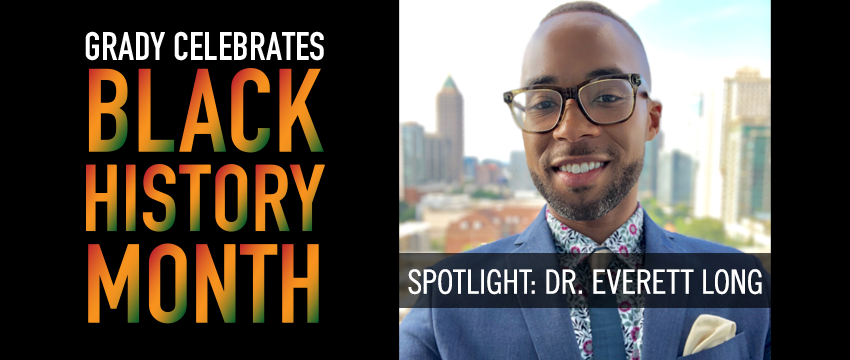Everett Long celebrates excellence in the black community, advises diverse students

Everett Long celebrates excellence in the black community, advises diverse students
Editor’s note: this is the second in a series of Grady College alumni profiles celebrating Black History Month.
For
University of Georgia alumni Everett Long (MA ‘10), February’s celebration of Black
History Month embodies black excellence.
As
a black man in the public health industry, Long’s unique perspective helped
shape his career aspirations. Starting in graduate school as a Spanish medial
interpreter for an Athens non-profit clinic, he helped patients have positive
medical experiences and advocated for health literacy. While communicating
similar health behaviors repeatedly to patients, Long realized a pattern with
Hispanic patients resulting in a larger health problem.
After earning a health and medical journalism masters, Long also received his Ph.D in health behavior and promotion at UGA. Because of a class in health communication, Long realized that his patient encounters were part of a larger cultural phenomenon that sparked his interest in theoretical applications to help solve the health problem. With the support of Grady courses and faculty, Long developed the skills to create a research thesis about cultural communication surrounding chronic disease in the Hispanic population.
His
interest led him to conduct a research study in Morelia, Mexico, where he worked
to explain the cultural phenomenon regarding a correlation with people of color
and health concerns.
Now
a senior scientific research associate and project manager for DLH Corporation,
Long leads prevention communication contracts for the Centers of Disease
Control Prevention, National Centers for HIV/AIDS, Viral Hepatitis, STD and
Tuberculosis Prevention.
Long
said that this societal problem targeting racial groups explains why being black
in America inevitably worsens health conditions and creates barriers in
workplace environments.
“When
the reporting increased on the epidemic of the killing of black men, starting
with Trayvon Martin, I was working on an initiative about black men and chronic
disease—the numbers can be bleak,” Long said.
Patterns
in health and workplace biases shows a need for diversity, especially in the
field of public health. Long explains that more diversity equates to improved
understanding of different population’s perspectives by having representation
in those populations. He believes that by ensuring efforts to address the
health of communities and include professionals who are members of those
communities, leadership will affect change.
“As
a black public health professional, I know that it is empowering when you can
harness this perspective for good,” Long said.
As
a student of predominantly white institutions, Long received little education
in black history, and now turns toward the arts and events such as annual Black
History Awards and Dinner and UGA’s Museum of Art to further educate himself.
“The
older I get, the more important it became to me to keep learning more and more
about black history,” Long said, after explaining he once listened to 25 hours
of a black history text book to make up for his lack of knowledge.
Long
advises young professionals pursuing journalism and public health careers to
find mentors inside and outside of the workplace. Specifically for diverse
students, he suggests finding a mentor of similar ethnic background to go to
for advice.
“When
you enter your career, you can’t always see the politics or biases at play, and
having someone who can see things from experience and help you manage is
critical,” Long said. “Use this person to ask the questions you may not feel
comfortable asking others. Be intentional about that mentor.”